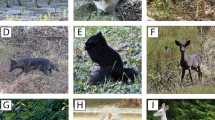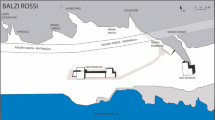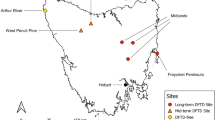Abstract
In primates, living in an anthropogenic environment can significantly improve an individual’s fitness, which is likely attributed to access to anthropogenic food resources. However, in non-professionally provisioned groups, few studies have examined whether individual attributes, such as dominance rank and sex, affect primates’ ability to access anthropogenic food. Here, we investigated whether rank and sex explain individual differences in the proportion of anthropogenic food consumed by macaques. We observed 319 individuals living in nine urban groups across three macaque species. We used proportion of anthropogenic food in the diet as a proxy of access to those food resources. Males and high-ranking individuals in both sexes had significantly higher proportions of anthropogenic food in their diets than other individuals. We speculate that unequal access to anthropogenic food resources further increases within-group competition, and may limit fitness benefits in an anthropogenic environment to certain individuals.

Similar content being viewed by others
References
Altmann J, Muruthi P (1988) Differences in daily life between semiprovisioned and wild-feeding baboons. Am J Primatol 15:213–221. https://doi.org/10.1002/ajp.1350150304
Bates D, Maechler M, Bolker B (2011) lme4: linear mixed-effects models using S4 classes. R package version 0.999375-42. http://CRAN.R-project.org/package=lme4
Becker DJ, Hall RJ (2014) Too much of a good thing: resource provisioning alters infectious disease dynamics in wildlife. Biol Lett 10:20140309. https://doi.org/10.1098/rsbl.2014.0309
Berman CM, Li JH (2002) Impact of translocation, provisioning and range restriction on a group of Macaca thibetana. Int J Primatol 23:383–397. https://doi.org/10.1023/A:1013891730061
Berman CM, Li J, Ogawa H, Ionica C, Yin H (2007) Primate tourism, range restriction, and infant risk among Macaca thibetana at Mt. Huangshan, China. Int J Primatol 28:1123–1141. https://doi.org/10.1007/s10764-007-9199-4
Dittus WPJ (1977) The social regulation of population density and age–sex distribution in the toque monkey. Behaviour 63(3–4):281–322
Dixson AF, Bossi T, Wickings EJ (1993) Male dominance and genetically determined reproductive success in the mandrill (Mandrillus sphinx). Primates 34:525–532. https://doi.org/10.1007/BF02382663
El Alami A, Van Lavieren E, Rachida A, Chait A (2012) Differences in activity budgets and diet between semiprovisioned and wild-feeding groups of the endangered Barbary macaque (Macaca sylvanus) in the Central High Atlas Mountains, Morocco. Am J Primatol 74:210–216. https://doi.org/10.1002/ajp.21989
Fa JE (1985) Provisioning of Barbary macaques on the Rock of Gibraltar. In: Box HO (ed) Primate responses to environmental change. Springer, Bristol, pp 137–153
Fedigan LM (1983) Dominance and reproductive success in primates. Am J Phys Anthropol 26:91–129. https://doi.org/10.1002/ajpa.1330260506
Fragaszy DM, Izar P, Liu Q, Eshchar Y, Young LA, Visalberghi E (2016) Body mass in wild bearded capuchins, (Sapajus libidinosus): ontogeny and sexual dimorphism. Am J Primatol 78:473–484. https://doi.org/10.1002/ajp.22509
Fujii K, Jin J, Shev A, Beisner B, McCowan B, Fushing H (2016) Perc: using percolation and conductance to find information flow certainty in a direct network. R Packag. version 0.1.2. http://CRA
Harcourt AH (1987) Dominance and fertility among female primates. J Zool 213:471–487
Hernandez-Pacheco R, Delgado DL, Rawlins RG, Kessler MJ, Ruiz-Lambides AV, Maldonado E, Sabat AM (2016) Managing the Cayo Santiago rhesus macaque population: the role of density. Am J Primatol 78:167–181. https://doi.org/10.1002/ajp.22375
Ilham K, Rizaldi, Nurdin J, Tsuji Y (2018) Effect of provisioning on the temporal variation in the activity budget of urban long-tailed macaques (Macaca fascicularis) in West Sumatra, Indonesia. Folia Primatol 25163:347–356. https://doi.org/10.1159/000491790
Jaman MF, Huffman MA (2013) The effect of urban and rural habitats and resource type on activity budgets of commensal rhesus macaques (Macaca mulatta) in Bangladesh. Primates 54:49–59. https://doi.org/10.1007/s10329-012-0330-6
Kaburu Stefano SK, Beisner B, Balasubramaniam KN, Marty PR, Bliss-Moreau E, Mohan L, Rattan SK, Arlet ME, Atwill ER, McCowan B (2019a) Interactions with humans impose time constraints on urban-dwelling rhesus macaques (Macaca mulatta). Behaviour. https://doi.org/10.1163/1568539X-00003565
Kaburu Stefano S K, Marty PR, Beisner B, Balasubramaniam KN, Bliss-Moreau E, Kaur K, Mohan L, McCowan B (2019b) Rates of human–macaque interactions affect grooming behavior among urban-dwelling rhesus macaques (Macaca mulatta). Am J Phys Anthropol 168:92–103. https://doi.org/10.1002/ajpa.23722
Kaplan BS, O’Riain MJ, van Eeden R, King AJ (2011) A low-cost manipulation of food resources reduces spatial overlap between baboons (Papio ursinus) and humans in conflict. Int J Primatol 32:1397–1412. https://doi.org/10.1007/s10764-011-9541-8
Koganezawa M, Imaki H (1999) The effects of food sources on Japanese monkey home range size and location, and population dynamics. Primates 40:177–185. https://doi.org/10.1007/BF02557709
Kurita H (2007) Comparison of artificial food intake between high- and low-ranking females among provisioned, free-ranging Japanese macaques (Macaca fuscata) at Takasakiyama—preliminary report. Prim Res 23:25–32. https://doi.org/10.2354/psj.23.25
Kurita H, Sugiyama Y, Ohsawa H, Hamada Y, Watanabe T (2008) Changes in demographic parameters of Macaca fuscata at Takasakiyama in relation to decrease of provisioned foods. Int J Primatol 29:1189–1202. https://doi.org/10.1007/s10764-008-9296-z
Leiva D, de Vries H (2011) Steepness: testing steepeness of dominance hierarchies. R package version 0.2. http://CRAN.R-project.org/package=steepness
Maibeche Y, Moali A, Yahi N, Menard N (2015) Is diet flexibility an adaptive life trait for relictual and peri-urban populations of the endangered primate Macaca sylvanus? PLoS One 10:1–22. https://doi.org/10.1371/journal.pone.0118596
Malaivijitnond S, Hamada Y (2008) Current situation and status of long-tailed macaques (Macaca fascicularis) in Thailand. Trop Nat Hist 8:185–204
Marechal L, Semple S, Majolo B, Qarro M, Heistermann M, MacLarnon A (2011) Impacts of tourism on anxiety and physiological stress levels in wild male Barbary macaques. Biol Conserv 144:2188–2193. https://doi.org/10.1016/j.biocon.2011.05.010
Martin P, Bateson P (1993) Measuring behaviour. Cambridge University Press, Cambridge
Marty PR, Hodges K, Agil M, Engelhardt A (2017) Alpha male replacements and delayed dispersal in crested macaques (Macaca nigra). Am J Primatol 79:e22448. https://doi.org/10.1002/ajp.22448
Marty PR, Beisner B, Kaburu SSK, Balasubramaniam K, Bliss-Moreau E, Ruppert N, Sah SAM, Ismail A, Arlet ME, Atwill ER, McCowan B (2019) Time constraints imposed by anthropogenic environments alter social behaviour in long-tailed macaques. Anim Behav 150:157–165. https://doi.org/10.1016/j.anbehav.2019.02.010
McCarthy MS, Matheson MD, Lester JD, Sheeran LK, Li J, Wagner RS (2009) Sequences of Tibetan macaque (Macaca thibetana) and tourist behaviors at Mt. Huangshan, China. Prim Conserv 24:145–151. https://doi.org/10.1896/052.024.0113
McKinney T (2011) The effects of provisioning and crop-raiding on the diet and foraging activities of human-commensal white-faced Capuchins (Cebus capucinus). Am J Primatol 73:439–448. https://doi.org/10.1002/ajp.20919
McLennan MR, Ganzhorn JU (2017) Nutritional characteristics of wild and cultivated foods for chimpanzees (Pan troglodytes) in agricultural landscapes. Int J Primatol 38:122–150. https://doi.org/10.1007/s10764-016-9940-y
Mori A (1995) Rank and age related feeding strategy observed through field experiments in the Koshima group of Japanese macaques. Primates 36:11–26. https://doi.org/10.1007/BF02381912
Oro D, Genovart M, Tavecchia G, Fowler MS, Martínez-Abraín A (2013) Ecological and evolutionary implications of food subsidies from humans. Ecol Lett 16:1501–1514. https://doi.org/10.1111/ele.12187
Plavcan J (2001) Sexual dimorphism in primate evolution. Am J Phys Anthropol 53:25–53. https://doi.org/10.1002/ajpa.10011
R Development Core Team (2009) R: a language and environment for statistical computing
Ram S, Venkatachalam S, Sinha A (2003) Changing social strategies of wild female bonnet macaques during natural foraging and on provisioning. Curr Sci 84:780–790. https://www.jstor.org/stable/24107582
Riley EP, Tolbert B, Farida WR (2013) Nutritional content explains the attractiveness of cacao to crop raiding Tonkean macaques. Curr Zool 59:160–169. https://doi.org/10.1093/czoolo/59.2.160
Saj T, Sicotte P, Paterson JD (1999) Influence of human food consumption on the time budget of vervets. Int J Primatol 20:974–977. https://doi.org/10.1023/A:1020886820759
Sapolsky RM, Share LJ (2004) A Pacific culture among wild baboons: its emergence and transmission. PLoS Biol 2:E106. https://doi.org/10.1371/journal.pbio.0020106
Sengupta A, Radhakrishna S (2018) The hand that feeds the monkey: mutual influence of humans and rhesus macaques (Macaca mulatta) in the context of provisioning. Int J Primatol 39:817–830. https://doi.org/10.1007/s10764-018-0014-1
Sha JCM, Hanya G (2013) Diet, activity, habitat use, and ranging of two neighboring groups of food-enhanced long-tailed macaques (Macaca fascicularis). Am J Primatol 75:581–592. https://doi.org/10.1002/ajp.22137
Soumah AG, Yokota N (1991) Female rank and feeding strategies in a free-ranging provisioned troop of Japanese macaques. Folia Primatol 57:191–200. https://doi.org/10.1159/000156586
Southwick CH, Siddioi MF, Farooqui MY, Pal BC (1976) Effects of artificial feeding on aggressive behaviour of rhesus monkeys in India. Anim Behav 24:11–15. https://doi.org/10.1016/S0003-3472(76)80093-0
Strum SC (1994) Prospects for management of primate pests. Rev d’Ecologie La Terre La Vie 49:295–306
Sugiyama Y, Ohsawa H (1982) Population dynamics of Japanese monkeys with special reference to the effect of artificial feeding. Folia Primatol 39:238–263
Sugiyama Y, Kurita H, Matsui T, Kimoto S, Egawa J (2014) Congenital malformations in Japanese macaques (Macaca fuscata) at Takasakiyama. Primates 55:303–311. https://doi.org/10.1007/s10329-014-0405-7
Warren Y, Higham JP, Maclarnon AM, Ross C (2011) Crop-raiding and commensalism in olive baboons: the costs and benefits of living with humans. In: Sommer V, Ross C (eds) Primates of Gashaka. Springer, Chicago, pp 307–332
Yeager CP (1996) Feeding ecology of the long-tailed macaque (Macaca fascicularis) in Kalimantan Tengah, Indonesia. Int. J. Primatol. 17:51–62. https://doi.org/10.1007/BF02696158
Acknowledgements
We are thankful to the Economic Planning Unit Malaysia, the Forestry Department of Peninsular Malaysia, the Department of Wildlife and National Parks Peninsular Malaysia, Tourism Selangor, the Kerala Forest and Wildlife Department, and the Himachal Pradesh Forest Department for giving permission to conduct our research in Malaysia and India. We thank our research assistants Camille Luccisano, Eduardo Saczek, Silvia La Gala, Nur Atiqua Tahir, Shelby Samartino, Rachael Hume, Taniya Gill, Kawaljit Kaur, Bidisha Chakraborty, Benjamin Sipes, Nalina Aiempichitkijkarn Pooja Dongre, Mohammed Ismail, Megha Majoe, Rajarshi Saha, Alvaro Sobrino, and Menno Van Berkel for their help in collecting data. We also thank the editor and two anonymous referees for their helpful comments on earlier drafts of this manuscript. This work was supported by the U.S. National Science Foundation (Grant no. 1518555).
Author information
Authors and Affiliations
Corresponding author
Additional information
Publisher's Note
Springer Nature remains neutral with regard to jurisdictional claims in published maps and institutional affiliations.
About this article
Cite this article
Marty, P.R., Balasubramaniam, K.N., Kaburu, S.S.K. et al. Individuals in urban dwelling primate species face unequal benefits associated with living in an anthropogenic environment. Primates 61, 249–255 (2020). https://doi.org/10.1007/s10329-019-00775-4
Received:
Accepted:
Published:
Issue Date:
DOI: https://doi.org/10.1007/s10329-019-00775-4




